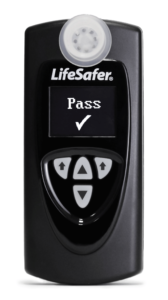In the State of Louisiana, an ignition interlock device (IID) is required for all alcohol-related convictions, including first-time offenses. Louisiana law does not provide for an exemption or waiver to the IID requirement. Obtaining a hardship license does not exempt the offender from the IID requirement.
An IID is a small device used to monitor the blood alcohol content (BAC) of a person who is operating a vehicle. The device is connected to the vehicle’s ignition system. Prior to starting the vehicle, the driver blows into the device to submit a breath alcohol sample. If the IID detects alcohol in the driver’s breath that is above a pre-set limit, the IID prevents the vehicle from starting. The driver is required to submit random breath samples, or rolling re-tests while operating the vehicle. If the rolling re-test results in a BAC that is higher than a pre-set limit, the IID sounds the vehicle’s horn and flashes the lights. The device continues to activate the horn and lights until the driver submits a clean breath sample or turns off the vehicle’s ignition.
IIDs must be installed in all vehicles operated by the offender. The offender must submit to the court the lease agreement and installation invoice as proof of IID installation. Driving privileges will not be reinstated until the offender installs the IID and submits proof of installation to the court. The IID must remain installed for the duration of the suspension of driving privileges with a minimum requirement of 180 days.
The offender is responsible for any and all costs associated with the IID, including installation, leasing, maintenance, monitoring and removal. If the offender installs IIDs on more than one vehicle, the offender is responsible for paying the costs associated with all of the installed IIDs.
The IID requirement begins on the date that driving privileges are reinstated or when the offender obtains a hardship license. Hardship licenses allow offenders to drive during their suspension periods to maintain employment and conduct other necessary personal business. To obtain a hardship license, the offender must provide to the Office of Motor Vehicles proof of financial responsibility, the IID lease agreement and installation agreement, a recommendation letter from the Louisiana Support Services and a court order or judgment. The offender is responsible for any and all fees associated with obtaining a hardship license.
If the offender is required to operate an employer-owned vehicle within the normal scope of employment, the offender must submit to the Office of Motor Vehicles a written statement from the employer that documents the employer’s awareness of the ignition interlock device restriction. Once the statement has been submitted, the offender may operate an employer-owned vehicle that is not equipped with an IID. If the offender owns the company, the offender is restricted from operating the employer-owned vehicle if the vehicle is not equipped with an IID.
Louisiana Ignition Interlock Resources
- Louisiana Office of Motor Vehicles: https://www.expresslane.org/Pages/default.aspx
Single-State Steps
- Requirements for hardship licenses vary, so call the Louisiana Office of Motor vehicles at 225-925-6146 to determine if you are eligible for a hardship license.
- You may need various documents to apply for your hardship license, including SR-22 proof of insurance, your completed LifeSafer interlock lease agreement, a recommendation from support services, and a court order.
- Take your required documents to a Louisiana Motor Vehicle Field office to obtain your hardship license.

